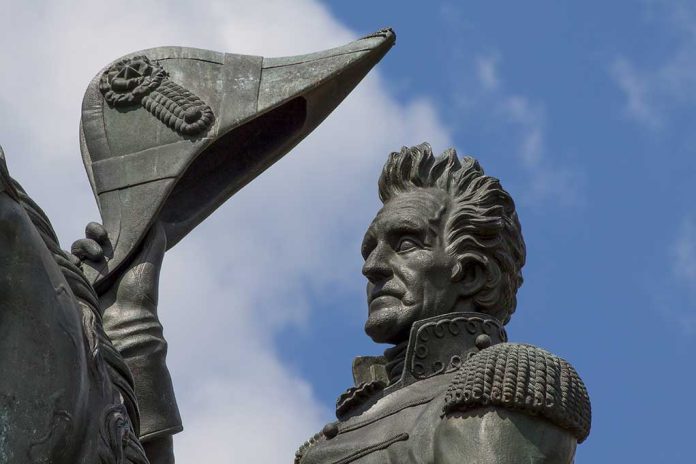
(NationRise.com) – Andrew Jackson, the figure we see on the $20 bill, served the United States as its 7th president. Jackson had one goal as president, and that was to represent the common man in the US. He gained his nickname, the “violent president,” due to his history of brawls and duels.
The Early Life of Andrew Jackson
Though his exact birthplace is unknown, Jackson was born in the backcountry of the Carolinas, so close to the border of North and South Carolina that both states consider Jackson a native of their state. His education was inadequate as he received little formal schooling. Jackson held a lifelong grudge against the British after his mother and two brothers were killed during an invasion by Great Britain between 1780 and 1781.
For about two years in Jackson’s late teens, he read law, which earned him admission to the North Carolina bar. Jackson eventually moved to what is now known as Tennessee and became a prosecuting lawyer in what would later become Nashville. After beginning his own practice, Jackson married a local colonel’s daughter. The two accumulated enough wealth to build a mansion in Hermitage, TN and acquire some slaves.
Jackson’s Early Political Career
Jackson was the first man from the state of Tennessee to be elected to the US House of Representatives. However, his time in the House was short-lived, as he did not seek to be reelected and instead retreated to his home in 1797. Not long after, Jackson was elected to the US Senate. He only served a year before being elected as judge of the superior court of Tennessee. His days in politics came to an end when he was chosen to head the Tennessee militia.
Becoming President
With a successful run as a major general during the War of 1812 and conflicts thereafter, Jackson was popular enough to make a presidential bid. By 1824, Jackson’s supporters had rallied enough to earn him a nomination and seat in the US Senate. The race eventually came down to three final candidates: Jackson, Adams, and William H. Crawford, who was essentially a forfeit as he had suffered a stroke and was not fit for duty.
The decision between Adams and Jackson was left to the US House of Representatives. Henry Clay, the Speaker of the House, placed fourth in the race and threw his support behind Adams — a move that was later dubbed a “corrupt bargain” by Jackson’s supporters as Clay was named Adams’ Secretary of State.
Jackson won the presidency just four years later, despite negative attacks aimed at his wife, who had still been married when the two initially fell in love. Not long after, Rachel Jackson died, which Andrew believed was the result of the negative press against the couple. Jackson’s presidency saw the birth of two major political parties: the Democrats, which supported Jackson, and the Whig Party, which opposed him.
Jackson was stubborn and made it known that he was the sole ruler of his administration, prompting some political cartoonists to depict him as “King Andrew I.”
Jackson’s Presidential Years
Jackson, despite supporting the rights of the states in principle, stood against South Carolina’s attempt to declare federal tariffs invalid within the state’s borders. Jackson ordered federal troops to go into South Carolina and enforce federal laws while also asking Congress to lower the tariffs. Thankfully, South Carolina backed down before there was any bloodshed or violence.
He showed less compassion for the Cherokee Indians, however, when officials in Georgia moved in on their land. He took no action to preserve the Indians’ rights and went as far as to decline a ruling by the US Supreme Court that Georgia had no say over tribal lands. The Cherokee eventually signed a treaty in 1835, giving up their land in exchange for territory west of Arkansas. About 15,000 Native Americans were forced to move in 1838 along the Trail of Tears, which saw thousands die.
Changed America
Andrew Jackson has served the United States in several aspects of both politics and the military. While he may not have necessarily been what we would call a “good person,” he certainly changed America — for both good and bad. One of the few presidents to leave the White House more popular than when he arrived, Jackson retired to his Hermitage home, where he died of congestive heart failure on June 8th, 1845.
Copyright 2023, NationRise.com















